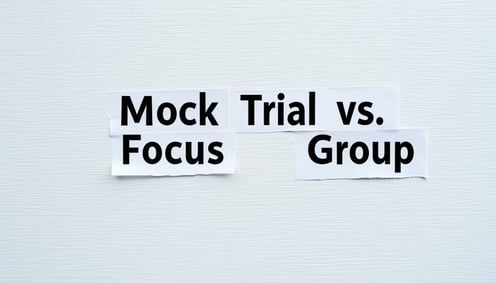
Two of the most important tools in jury research that trial consultants provide are legal focus groups and mock trials. These terms are often used interchangeably, but there are a few distinctions between the two that are important to note. Legal focus groups and mock trials both provide test environments for elements of a case that is set for trial, but they differ in terms of the information that is gathered.
Legal Focus Groups
A legal focus group allows you to gather people demographically similar to a potential jury and test out their reactions to individual elements or your entire case. A professional trial consultant acts as a neutral moderator to present aspects you want to test, such as:
- Evidence
- Trial exhibit plans, videos, or graphics
- Recorded depositions or live witness testimony
- Opening or closing argument scripts
- Cross-examination questions
Mock Trials
A mock trial offers a test environment to identify opportunities, adjust strategies, and improve case presentation before a real trial. Mock trials provide many useful benefits, such as:
- Obtain Unbiased Viewpoints
- Clarify Your Evidence
- Evaluate Witness Credibility
- Test Your Arguments
- Obtain New Evidence
- Refine Negotiation Strategy
Main Distinctions
The main distinction between a legal focus group and a mock trial is that a legal focus group is used to find early preliminary findings, whereas a mock trial provides more confirmatory research. Typically, when focus groups are done, very little is known about the case early on in the litigation cycle, and attorneys are able to provide respondents with the broad case facts, arguments, evidence, and testimony that would most likely come up during litigation. In a focus group setting, you are able to have more discussion with a group of jurors on their opinions on specific matters rather than them deliberating on their own.
Mock trial research is typically structured like a trial with verdict forms, jury instructions, opening statements, and closing arguments. This kind of research replicates trial conditions more faithfully and allows the potential to foresee a probable trial outcome. A mock trial also utilizes jury deliberations, while a legal focus group does not.
I have overseen both mock trials and legal focus groups for many cases, and the outcomes from each are useful in different stages of trial prep. While both jury research options are different, they also go together as stepping stones to success at trial. A simple three-hour focus group with broad topics can help attorneys narrow down and formulate more structured arguments in a mock trial setting and get honest jury reactions that will set them up to craft their best arguments for trial.
In conclusion, while they cover different levels of research, spanning from moderated structured discussion to self-led deliberations, both legal focus groups and mock trials are useful tools when it comes to conducting jury research and gaining knowledge on potential outcomes for trial.
Tags:
Jury Research
Post by Brook Klussmann
Apr 23, 2025 1:55:42 PM
Apr 23, 2025 1:55:42 PM
Originally from Brenham, Texas Brook graduated with both a BA in Psychology and a BS in Criminal Justice from Texas State University in 2019. She then went on to receive her MA in Forensic & Legal Psychology from Marymount University in 2021. Soon after graduation, Brook started doing contract background research work with Trask Consulting.
In September 2022, Brook joined First Court as a Contract Report Writer and Jury Analyst and in May 2023, started as an Associate Trial Consultant and Project Manager at First Court



.jpg?width=520&height=294&name=Blog%20Post%20Images%20(1).jpg)

Comments